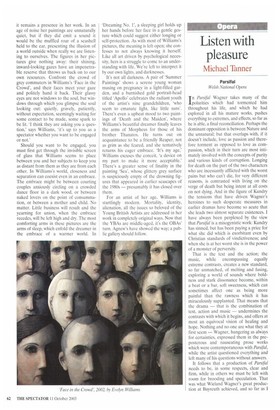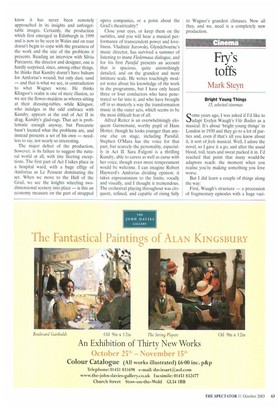Listen with Pleasure
Michael Tanner
Parsifal Welsh National Opera
In Parsifal Wagner takes many of the polarities which had tormented him throughout his life, and which he had explored in all his mature works, pushes everything to extremes, and effects, so far as he is able, a final reconciliation. Perhaps the dominant opposition is between Nature and the unnatural; but that overlaps with, if it doesn't include, love as passion and therefore torment as opposed to love as compassion, which in their turn are most intimately involved with the concepts of purity and various kinds of corruption. Longing for death on the part of the two characters who are incessantly afflicted with the worst pains but who can't die, for very different reasons, is contrasted with living on the verge of death but being intent at all costs on not dying. And in the figure of Kundry the tensions that have driven Wagner's heroines to such desperate measures in earlier dramas have become so acute that she leads two almost separate existences. I have always been perplexed by the view that Parsifal is a misogynistic work: Kundry has sinned, but has been paying a price for what she did which is exorbitant even by Christian standards of vindictiveness; and when she is at her worst she is in the power of a monster of perversity.
That is the text and the action; the music, while encompassing equally extreme contrasts, creates a new standard, so far unmatched, of melting and fusing, exploring a world of sounds where boldness and stark dissonance become, within a beat or a bar, soft sweetness, which can sometimes affect one as being more painful than the rawness which it has miraculously supplanted. That means that the drama — that is the combination of text, action and music — undermines the contrasts with which it begins, and offers at most an equivocal vision of healing and hope. Nothing and no one are what they at first seem — Wagner, hungering as always for certainties, expressed them in the preposterous and nauseating prose works which were contemporaneous with Parsifal, while the artist questioned everything and left many of his questions without answers.
It follows that a production of Parsifal needs to be, in some respects, clear and firm, while in others we must be left with room for brooding and speculation. That was what Wieland Wagner's great production at Bayreuth achieved, and so far as I know it has never been remotely approached in its insights and unforgettable images. Certainly, the production which first emerged in Edinburgh in 1999 and is now to be seen in Wales and on tour doesn't begin to cope with the greatness of the work and the size of the problems it presents. Reading an interview with Silviu Purcarete, the director and designer, one is hardly surprised, since, among other things, he thinks that Kundry doesn't have balsam for Amfortas's wound, but only dust, sand — and that is what we see, in contradiction to what Wagner wrote. He thinks Klingsor's realm is one of mere illusion, so we see the flower-maidens as whores sitting at their dressing-tables, while Klingsor, who indulges in the odd embrace with Kundry, appears at the end of Act H in drag, Kundry's glad-rags. That act is problematic enough anyway, but Purcarete hasn't located what the problems are, and instead presents a set of his own — needless to say, not nearly so interesting.
The major defect of the production, however, is its failure to suggest the natural world at all, with tiny fleeting exceptions. The first part of Act I takes place in a hospital ward, with a huge effigy of Arnfortas as Le Penseur dominating the set. When we move to the Hall of the Grail, we see the knights wheeling twodimensional scenery into place — is this an economy measure on the part of strapped opera companies, or a point about the Grail's theatricality?
Close your eyes, or keep them on the surtitles, and you will hear a musical performance of transcendent power and loveliness. Vladimir Jurowski, Glyndebourne's music director, has survived a summer of listening to inane Fledemmus dialogue, and for his first Patsifal presents an account that is spacious, quite astonishingly detailed, and on the grandest and most intimate scale. He writes touchingly modest notes about his knowledge of the work in the programme, but I have only heard three or four conductors who have penetrated so far into it, and who have brought off in so masterly a way the transformation music in the outer acts, which seems to be the most difficult feat of all.
Alfred Reiter is an overwhelmingly eloquent Gurnemanz, worthy pupil of Hans Hotter, though he looks younger than anyone else on stage, including Parsifal. Stephen O'Mara has the voice for that part, but scarcely the personality, especially in Act II. Sara Fulgoni is a thrilling Kundry. able to caress as well as curse with her voice, though even more temperament would be welcome. I can imagine Robert Hayward's Amfortas dividing opinion: it takes expressionism to the limits, vocally and visually, and I thought it tremendous. The orchestral playing throughout was eloquent, refined, and capable of rising fully to Wagner's grandest climaxes. Now all they, and we, need is a completely new production.



















































































 Previous page
Previous page